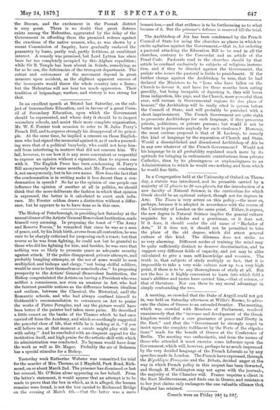In a Congregation held at the University of Oxford on
Thurs- day, a statute was introduced, and its preamble carried by a, majority of 57 placets to 20 non-placets, for the introduction of a new faculty of Natural Science, in the curriculum for which Greek should be an optional subject, though not for degrees in Arts. The Times is very severe on this policy,—the more so, perhaps, because it is adopted in accordance with the course of the University of London on the same point. Either, it argues, the new degree in Natural Science implies the general culture requisite for a scholar and a gentleman, or it does not. If it does, it should confer the old name of " Bachelor of Arts." If it does not, it should not be permitted to take the place of the old degree, which did attest general culture of this kind. The dilemma does not strike us as very alarming. Different modes of training the mind may be quite sufficiently distinct to deserve discrimination, and to suggest very different fields of capacity, and yet may be alike calculated to give a man self-knowledge and resource. The truth is, that subjects of study multiply so fast, that it is impossible to take a very wide culture now up to a very high point, if there is to be any thoroughness of study at all. But not the less is it highly convenient to learn into which field a man's abilities and tastes have carried him,—that of science, or that of literature. Nor can there be any moral advantage in simply confounding the two.


































 Previous page
Previous page